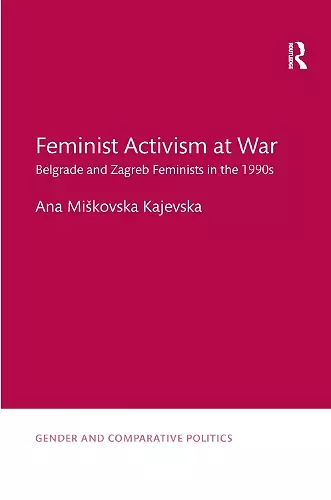Feminist Activism at War
Belgrade and Zagreb Feminists in the 1990s
Format:Paperback
Publisher:Taylor & Francis Ltd
Published:16th Jul '19
Currently unavailable, and unfortunately no date known when it will be back
This paperback is available in another edition too:
- Hardback£145.00(9781138697683)

This book describes, compares, explains, and contextualises the positionings, i.e. discourses and activities, which feminists in Belgrade, Serbia and Zagreb, Croatia produced in relation to the (post-)Yugoslav wars of the 1990s. Two types of positionings are analysed: those which the feminists have produced on the (sexual) war violence and those which they have produced on each other.
Applying a Bourdieuian framework and using interviews with key feminist and peace activists in the region alongside a thorough examination of organisational documents and printed media articles, Ana Miškovska Kajevska challenges the common suggestion that the outbreak of the war violence in 1991 led to the same reorganisation of the Belgrade and Zagreb feminist fields. She corrects the understanding that the activists in each city, who had up until then worked together without tensions, divided at the same time and in the same manner into antinationalists and nationalists and began clashing with each other because of the different war-related positionings. Miškovska Kajevska explains further that the terms ‘antinationalist’ and ‘nationalist’ were not completely value-free and objective, and had different meanings attached to them. These designations were an essential part not only of the local and international efforts to stop the (sexual) war violence, but also of the struggle for legitimacy among the feminists in each city – endeavours in which many Western (feminist) academics, activists, and funders were involved, too.
In addition to providing insights into the situation in Croatia and Serbia, this book will also help increase the understanding of intra-feminist dynamics in other regions of the world which are dominated by nationalism and war violence, and where the work of the local feminists is closely intertwined with – and often dependent on – these activists’ contacts with foreign academic, funding, activist, and/or political entities.
'It will be difficult to overstate the relevance of this book beyond its apparent narrow regional focus – capitals of the two former Yugoslav republics. As the second decade of the 21st century ebbs towards its end, the populism, nationalism, racism and misogyny that marked the violent disintegration of Yugoslavia are back with a vengeance on a global scale. It appears easy to unite as feminists – nationally and internationally – against the most visible and most infamous populist icons. But, it is the nitty-gritty of daily work against the ‘us-and-them’ politics where the conflicting positioning, contesting interpretations, and labelling and silencing occur. We would be wise to learn – in this book - how this happens, if not how to prevent it from happening.'- Dr. Dubravka Zarkov, International Institute of Social Studies
'Miškovska Kajevska’s book challenges simplistic dichotomies that come with nationalism and war. Her incisive analysis dissects divisions that cut across and within Croatian and Serbian feminist groups in the 1990s. It offers a novel perspective on the feminist response to conflict, by conducting a rigorous comparison and marshalling persuasive evidence, and provides a lucid account of fragmentation and restructuring of civil society in the context of nationalism and war. It will be of great value to scholars of nationalism, democratisation and ethnic politics.'- Dr. Denisa Kostovicova, Associate Professor in Global Politics, London School of Economics and Political Science
The book’s sober and critical approach
towards the pre-existing literature and
the collected empirical data highlights the
importance of self-scrutiny and reflexivity
when dealing with processes of naming and
labelling, which are always relational and
have the power to shape reality in times of
political polarisation. Feminist Activism at
War is an extremely useful compendium,
not only for those readers interested in
post-Yugoslav gender and feminist history,
but also for those striving to understand
the complexity of political identification in
conflict and postconflict settings.
Bonfiglioli Chiara, Südosteuropa. Journal of Politics and Society
ISBN: 9780367371838
Dimensions: unknown
Weight: 276g
196 pages